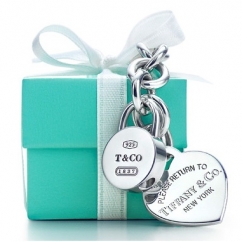Articles and News
COVID Business Divorces: Tiffany/LVMH Merger May Fall Through; Simon Bails On Taubman Purchase | June 10, 2020 (0 comments)

New York, NY—At least two planned luxury mergers may or won't take place in light of the pandemic and rising social unrest.
French luxury conglomerate LVMH was reported to be re-thinking its highly-anticipated plans to acquire Tiffany & Co., even before its disappointing quarterly report released June 9. The jeweler said same-store sales were down 44% in the fiscal third quarter ending April 30, sparking a 45% decline in revenue (to $555.5 million) and $64.6 million net loss (53 cents per share). Its earnings a year ago were $125 million, or $1.03 a share. Its shares Monday were trading at $122.18, $17 below the agreed-upon merger price of $135 per share.
About 70% of the retailer’s stores worldwide were closed for the pandemic. Jewelry sales, particularly engagement jewelry, tumbled: engagement jewelry was off by nearly 50%, more than any other category, but Tiffany CEO Alessandro Bogliolo told CNBC that the new collections in rose gold and gold and diamonds have been selling through to original projections even though consumers have not been able to visit stores. Online sales were up 23%, led by the United States and United Kingdom, up 14% and 15% respectively. Bogliolo also pointed to robust sales recovering in China as that nation reopened after the coronavirus pandemic, and believes the same will happen elsewhere.
LVMH had long sought to add America’s best-known luxury jewelry brand to its stable, giving it a better foothold in the American luxury market and a plum addition to its other brand holdings: Bvlgari, Hublot, Chaumet, Fred, and TAG Heuer. Despite Tiffany’s recent struggles, the French conglomerate recognized the value of its brand equity. Tiffany, meanwhile, welcomed the infusion of both cash and clout that LVHM would bring.
Related: LVMH Buys Tiffany
The two danced the usual business mating ritual: LVMH made an offer of $120 per share ($14.5 billion). Tiffany said “not good enough, do better.” LVMH sweetened the pot to $135 per share ($16.2 billion). As we say in the trade, mazal u’bracha. Deal done, subject to approval of Tiffany’s shareholders and regulatory authorities. No trouble was anticipated and the largest acquisition deal ever in the luxury sector was expected to be completed by mid-2020. Indeed, many of the regulatory authorities have already signed off on the deal.
But the coronavirus pandemic transformed the global retail scene into a ghost town. Then, just as everything was gearing up to reopen, the Memorial Day killing of African-American George Floyd at the hands of white police officers set off protests around the world and sparked a series of riots in the United States. Many of the riots occurred in upscale shopping districts, something that hasn’t happened in other periods of social unrest.
Related: Weekend Of Rioting Impacts Jewelers
Last week, both Reuters and Women’s Wear Daily reported that LVMH’s board of directors was beginning to have second thoughts about the purchase, citing a “deteriorating situation in the U.S. market.” Although jewelry and watches is the fastest-growing sector of the total luxury market, consultancy Bain & Co. expects global sales of luxury clothing, handbags, jewelry and cosmetics to fall by about 35% this year as shops around the world closed for the pandemic and international travel has all but stopped.
The deal's not dead yet, however. Reuters on Wednesday reported LVMH chairman Bernard Arnault was seeking ways to pressure Tiffany to lower the agreed-upon price of $135 per share, but on Friday said that LVMH won’t try repricing the deal—for now. Although Tiffany maintains it is a strong financial position, Arnault reportedly remains concerned about overpaying for the struggling jeweler in a United States retail market that looks nothing like it did last fall.
Separately, a definite COVID-related breakup is the Simon Property Group’s planned acquisition of rival mall developer Taubman Centers Inc. Simon, whose properties include some of the nation’s toniest upscale shopping malls, alleges that Taubman didn’t take adequate steps to ensure its properties remained solvent after the COVID pandemic forced their closure and called off the $3.6 billion deal.

The King of Prussia mall in Pennsylvania is one of Simon's many upscale properties. Image: Delco Times







